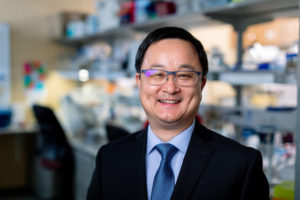UAMS and Mayo Clinic Researchers Discover Key to Unlocking Molecular Cancer Therapies
| Researchers at the University of Arkansas for Medical Sciences Winthrop P. Rockefeller Cancer Institute and the Mayo Clinic have discovered a way to supercharge molecular cancer treatments to destroy more cancer-causing proteins in cells.
The research findings of UAMS’ Hong-yu Li, Ph.D., the Helen Adams and Arkansas Research Alliance Endowed Chair in Drug Discovery and professor of Medicinal Chemistry and Chemical Biology in the UAMS College of Pharmacy, and Haojie Huang, Ph.D., the Gordon H. and Violet Partels professor of Cellular Biology at the Mayo Clinic, are featured in the August issue of Advanced Science.

Haojie Huang, Ph.D., the Gordon H. and Violet Partels professor of Cellular Biology at the Mayo Clinic.
Li and Huang’s research gives drug makers a new road map to enhance the molecular cancer treatment therapy by PROTAC technology, a rapidly evolving treatment that is in clinical trials. PROTACs (Proteolysis Targeting Chimeras) are genetically engineered molecular compounds that bridge cancer-causing proteins with the molecules that seek to destroy them.
“They’re like matchmakers,” said Huang, who sought out UAMS’ Li to work with him on the study five years ago. The two didn’t initiate the official collaboration until a year ago.
“I had always wanted to work with him,” said Huang, who met Li in an NIH study section. “I was very impressed by his expertise in chemistry and molecular biology. It’s been a really successful collaboration.”
Li currently holds two National Institutes of Health R01 grants to study cancer treatments.
Many cancer drugs target DNA binding proteins because they play essential roles in cancer cell development. Until now, these proteins generally have been considered undruggable. Current PROTACs don’t destroy enough of them.
“When you’re treating cancer, you want to destroy as many of the cancer-causing proteins as possible as quickly as possible,” said Li, who also serves as director of the Developmental Therapeutics Research Program at the Winthrop P. Rockefeller Cancer Institute.
Jingwei Shao, Ph.D., Wei Yan, Ph.D., and graduate student Anupreet Kharbanda in Li’s lab at UAMS by working with Huang’s lab found that adding an “oglio” or oligonucleotide, to the molecular compound degraded the targeted proteins completely.
“The oglio is essentially a tool that helps the molecules bind well to DNA binding proteins, so it’s very efficient for drug targeting,” said Li.
These O’PROTACs are complimentary to conventional PROTACs that degrade the proteins from within the cell instead of just inhibiting them. Enzalutamide is an example of a common inhibitor drug currently used in cancer treatment.
“They are highly programmable and can target hundreds of cancer-causing proteins,” said Li.
UAMS is the state’s only health sciences university, with colleges of Medicine, Nursing, Pharmacy, Health Professions and Public Health; a graduate school; a hospital; a main campus in Little Rock; a Northwest Arkansas regional campus in Fayetteville; a statewide network of regional campuses; and eight institutes: the Winthrop P. Rockefeller Cancer Institute, Jackson T. Stephens Spine & Neurosciences Institute, Harvey & Bernice Jones Eye Institute, Psychiatric Research Institute, Donald W. Reynolds Institute on Aging, Translational Research Institute, Institute for Digital Health & Innovation and the Institute for Community Health Innovation. UAMS includes UAMS Health, a statewide health system that encompasses all of UAMS’ clinical enterprise. UAMS is the only adult Level 1 trauma center in the state. UAMS has 3,275 students, 890 medical residents and fellows, and five dental residents. It is the state’s largest public employer with more than 12,000 employees, including 1,200 physicians who provide care to patients at UAMS, its regional campuses, Arkansas Children’s, the VA Medical Center and Baptist Health. Visit www.uams.edu or uamshealth.com. Find us on Facebook, X (formerly Twitter), YouTube or Instagram.###
